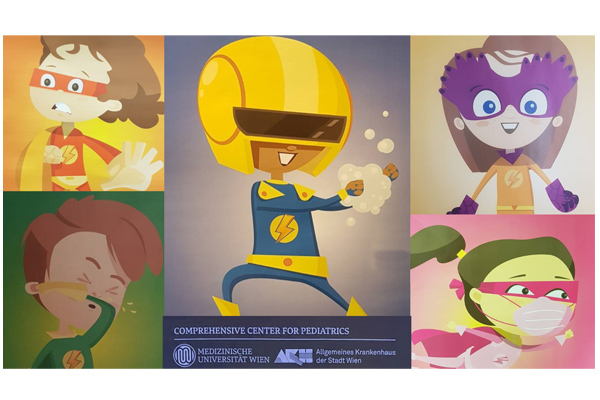
(Vienna, 15 September 2021) The Comprehensive Center for Pediatrics of MedUni Vienna and Vienna General Hospital received an award in the "Healthy living in times of Coronavirus" category for its "CARTOON" (CoronAviRus educaTiOn prOgramme for childreN) education programme at the Vienna Health Conference on 14 September 2021.
CARTOON was developed by an interdisciplinary team of clinical psychologists, educators and medical professionals. The aim of the programme is to strengthen the feeling of self-efficacy and confidence of 3- to 6-year-old children, and to teach them that they can help to protect themselves and play their part in containing the pandemic. It is hoped that this will alleviate fears and feelings of helplessness related to the Covid-19 pandemic. The programme aims to teach children, in a fun and experiential way, about the virus, the disease, and the associated measures. The education programme is also designed to help strengthen compliance and encourage children to implement hygiene and testing measures.
CARTOON is based on comic book superheroes, that were illustrated by Philipp Steinbauer from the University Clinic for Pediatrics and Adolescent Medicine and identified as characters with whom children can identify: Hero of the Distance, Captain Soapy Hands, Do not Touch Tina, Mister Sneeze and Flying Maskup Mona provide role models for the children. The superheroes accompanied the children throughout the entire programme, which consisted of five lessons: hand hygiene, sneezing etiquette, mask-wearing, social distancing, and theoretical knowledge about the coronavirus.
The programme was initially tested in a pilot project at the Day Hospital Ward for Pediatric Psychosomatics at MedUni Vienna and Vienna General Hospital. By way of an evaluation study, CARTOON was run in four kindergartens in Vienna. As well as the intervention group, there was a control group of children who had received no special teaching. A psychological assessment of emotional well-being, practical behaviours and knowledge of Covid-19 was conducted with both groups at three time points (at the beginning and end of the education programme and three months later). It was found that the superheroes served as a mnemonic for the children's hygiene measures and that their knowledge of the Coronavirus increased.
"The education programme represents a concept that can also be used in future pandemics when working with children," concludes Agnes Panagl, clinical and health psychologist in the Department of Clinical Psychology and Psychotherapy of the Medical Directorate of Vienna General Hospital.